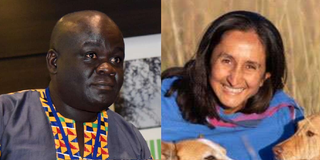Expert who teaches Kenyans how to live with lions wins Sh17m grant at Green Oscars

Leonard Akwany and Dr Shivani Bhalla, the two Kenyans celebrated in the Green Oscars the Royal Geographical Society in London.
Awards and cash prizes won’t stop coming in for a former Kenya Wildlife Service employee who began an initiative to teach Kenyans how to coexist with lions 16 years ago.
Dr Shivani Bhalla, a Kenyan-born and bred conservationist who lives in Samburu, is in the news for winning a top award during “the Green Oscars” held in London on Thursday. The win secures her organisation £100,000 (Sh17 million) in funding.
The Green Oscars is a nickname for the Whitley Awards for Conservation, an initiative of the Whitley Fund for Nature (WFN), a UK fundraising and grant-giving charity “that supports conservators working in their home countries across the Global South” as stated on its website.
There is one winner of the Whitley Gold Award every year and he or she must have won the Whitley Award before. Dr Bhalla did that in 2014.
“Whitley Awards are won competitively following a worldwide search. Applications are assessed by an expert judging panel, and winners receive £40,000 in project funding over one year,” says a statement on the Whitley Fund for Nature website.
The 2014 award wasn’t Dr Bhalla’s only gong. In 2013, she got the Rabinowitz-Kaplan Prize for the Next Generation in Wild Cat Conservation. In 2009, she was named Africa’s Young Women Conservation Biologist of the year by the Society of Conservation Biology. In 2018, she bagged the Virginia McKenna Award for Compassionate Conservation from the Born Free Foundation, a UK-based organisation.
The accolades abound for Dr Bhalla, but she wasn’t the only Kenyan celebrated in the Green Oscars which were on their 30th edition and which happened at the Royal Geographical Society in London. Dr Bhalla’s gold award was accompanied by six other first-time Whitley Award winners. One of those was Kenyan — Leonard Akwany.
Mr Akwany bagged his Whitley Award for his efforts to help native fish species in Lake Victoria rise above the pressures of overfishing.
“(His work) seeks to help native fish species recover after they more than halved due to unsustainable fishing and habitat degradation, which is tipping vulnerable waterside communities into food insecurity,” said the statement from the Whitley Fund for Nature unveiling the 2023 winners.
“Mr Akwany’s plans include the creation of a community-managed fishery reserve, improving the capacity of five local beach management units and will also address the poor involvement of women in fisheries management. Its success has the potential to have a much wider impact across Lake Victoria,” it added.
Dr Bhalla’s latest achievement will be a pat on her back for the efforts she has been making in Kenya’s North Rift. She is the founder and executive director of Ewaso Lions, an outfit “dedicated to conserving lions and other large carnivores by promoting coexistence between people and wildlife” as per its website.
“We are an independent 100 per cent African wildlife conservation organisation which engages and builds the capacity of key demographic groups (warriors, women, elders and children) by developing approaches to reduce human-carnivore conflict. Our conservation landscape includes three protected areas (Samburu, Buffalo Springs and Shaba National Reserves) and 11 community conservancies in northern Kenya,” it adds.
Dr Bhalla has a degree in environmental science from Lancaster University, a Master’s in wildlife biology and conservation from Edinburgh Napier University and a PhD in zoology that she obtained from Oxford University in 2017.
“Previously, she has worked for the Kenya Wildlife Service and Save the Elephants. Dr Bhalla moved to Samburu in 2002 and lives in the Ewaso Lions Camp in Westgate Conservancy,” says her bio on the Ewaso Lions website.





